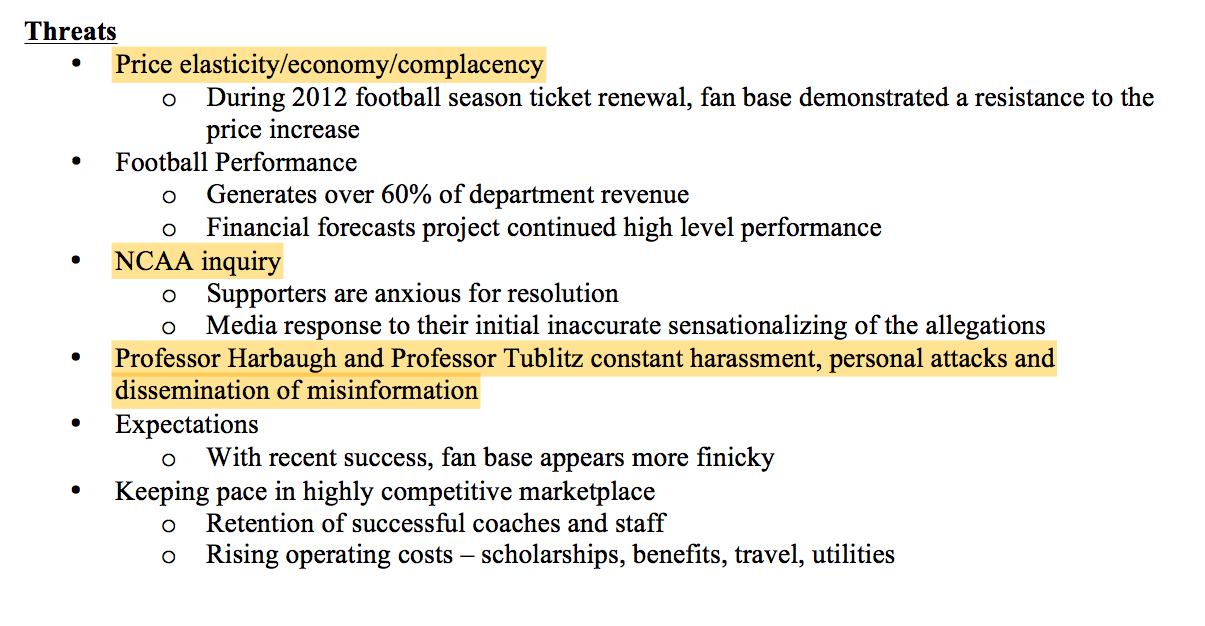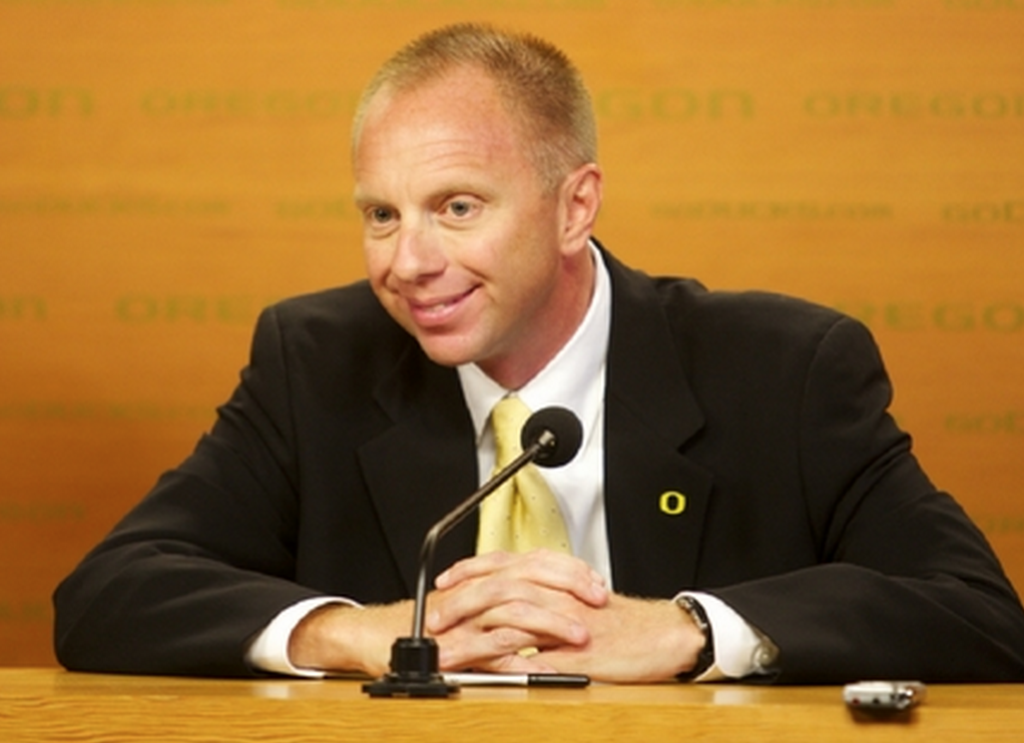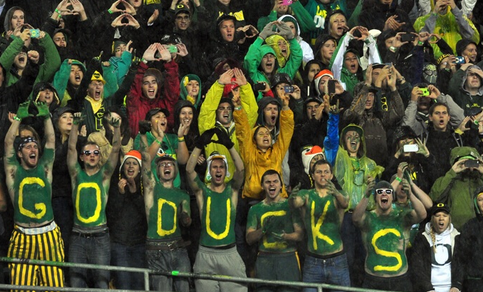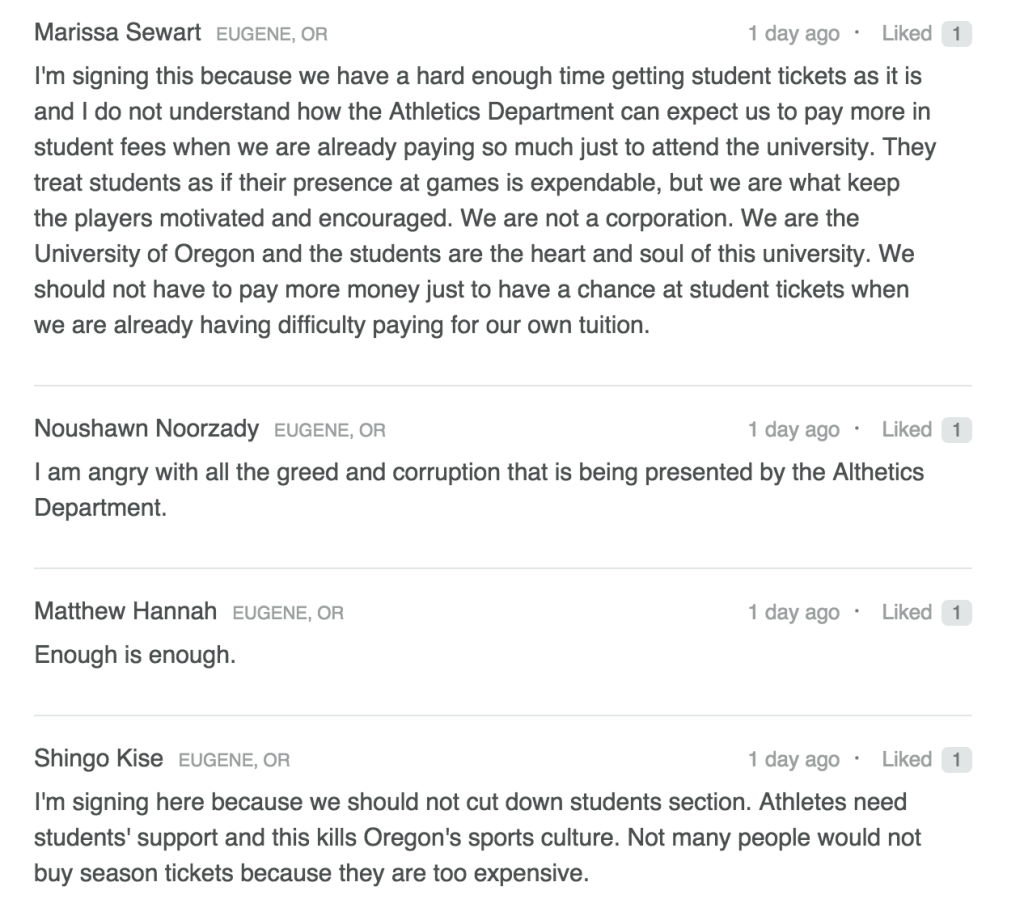12/19/2015 update:
John Solomon has the latest college football data, on CBSsports. Basketball demand is even lower, in part due to a secular trend, in part because many fans think Knight Arena is a soulless big box, and in part because some fans can’t stomach the sight of Dana Altman after how he handled the rape allegations.
So how are the Ducks going to pay for the admins Alamo Bowl game junkets, and the jock bosses bloated bonuses?
They’ll squeeze our UO students. Since regular fans won’t pay, AD Rob Mullens and AAD Eric Roedl are doing everything they can to extract more money from the ASUO student government, as explained below.
8/3/2015 update: Duck athletics uses monopoly power to discriminate against students
Price discriminate that is. All part of maximizing the profit they can extract from the students and spend on their own salaries. The Duck’s think their biggest threat is the elasticity of demand:

But that’s for the regular fan base. Rob Mullens can still put the squeeze on the students. Kenny Jacoby has the excellent report in the Daily Emerald on just how he’s going to do it, here:
Only 21 percent of enrolled UO students will get football tickets from the lottery each game
… The end result: Students won’t pay any more for tickets to athletic events, but 300 of their 5,448 seats at Autzen Stadium will be withdrawn from the online lottery and sold as student PAC-12 season ticket packages for $300 each.
The athletic department requested a 10 percent increase in student funds for tickets to sporting events last fall, then threatened to cut tickets if students did not pay at least a 3 percent increase. Stevenson said this is the third time he’s seen the athletic department request this increase.
“It’s just a negotiating tactic,” Stevenson said. “They ask for a 10 percent increase, knowing that will be negotiated down or toward a 3 percent increase. They usually want to have a consistent 3 percent increase.”
Members of the ACFC concluded that any increase in funds was inappropriate if students did not receive additional tickets in return, so they finally defaulted to no increase.
“I don’t really see why they always ask for more money,” Stevenson said. “In my opinion, they were trying to create a small amount of revenue really just on the backs of students.”
… “As far as student tickets, our goal is to get to the value of half what they would be worth for season tickets, and we’re not there,” Pintens said. “That difference has to be made up. So really, we’re falling short of our perceptions.”
Last year, however, football ticket prices stopped increasing. Economics professor Bill Harbaugh, who runs a blog called UO Matters, speculated that prices won’t be raised anymore because fans would rather watch the game on big screen TVs at home.
“What [the athletic department] would like to do is convert those student seats so it can charge other people more for them,” Harbaugh said. “From [the department’s] point of view, it’s lost revenue. But it’s supposed to be a college sport, so it’d be nice to have some students watch it.”
Our students are getting creative though. If the athletic department can earn money marketing the Ducks, why can’t student government earn money marketing the students?
EMU Board Chair Miles Sisk, who served as Senate vice president last year, said the ASUO finds itself in a predicament negotiating with the athletic department year after year.
“We’re always stuck between a rock and a hard place,” Sisk said. “We either give them tons and tons of money and get even more tickets — which is just a huge burden on the ASUO budget — or give them nothing more and lose tickets, which is what we did this year.”
Sisk said more creative ways for the ASUO to raise money for tickets do exist, but haven’t been fully explored, yet. For example, the NCAA profited from Taco Bell’s sponsorship of the student section at the national championship between Oregon and Ohio State because the game drew so many viewers.
Sisk said the ASUO could make a contract with a company to sponsor the student section as well.
“From the conversations I’ve had, we could probably pull in somewhere around $500,000 — maybe more — that would cut back on the cost of the tickets,” said Sisk.
Seems like a great plan. ASUO can charge ESPN for the right to show scenes like this, and use the money to pay for student tickets – instead of letting Rob Mullens and Eric Roedl use that ESPN money to subsidize their own salaries:
Or will the NCAA now start claiming they own the likenesses of regular students, like they do with athletes like Ed O’Bannon?
4/19/2015: UO fraternities and sororities call out Duck’s Rob Mullens and Eric Roedl
Long story here. Short version: Regular sports fans won’t pay enough for tickets to cover the Duck athletic department’s bloated salaries – they’d rather watch at home on ESPN. So AD Rob Mullens and his assistant Eric Roedl are trying to get the money to pay for their recent raises from the captive UO student market. UO’s students said no, so now Mullens and Roedl are threatening to cut the student ticket allotment. But the students are fighting back. Andrew Lubash has a Change.org petition with more than 500 signatures already, and hundreds of comments, e.g.:
And now UO’s fraternities and sororities are also opposing the Roedl/Mullens threat – apparently unanimously. The Daily Emerald has the story, here:
Dear Eric Roedl,
We, the elected leaders of Fraternity and Sorority life, support the ACFC and the ASUO in their efforts to negotiate a fair deal for students and Athletics when it comes to student football and basketball tickets. We firmly believe, given the increase in tuition costs next year, that students as a whole cannot afford to pay more money for the same number of football tickets that we received last year. We believe that the current allocation of football tickets is already too small and that you, as the Athletic Department, should be working to increase the number of students at our football games. It was disappointing to see that an increase in student football tickets was never on the table during your negotiations.
We wholeheartedly support all of our athletic teams and take great pride in our university programs. However, reducing the number of subsidized tickets hinders the participation of our members. We believe that every student should have the opportunity to attend games at their own university. Students and the Athletic Department both benefit by having a consistently large, boisterous student section at games. In fact, the environment created by students at Autzen Stadium is part of what makes our football program so great.
Currently, there are students on this campus that have failed to get a ticket to every single football game because of the limits you’ve placed on the number of tickets we are allocated. This is unacceptable and we demand change.
Please reconsider your stance and do not reduce the number of subsidized student football tickets for next year.
Sincerely,
PHC President | Rebecca Brennan | PHC President
PHC VP of Accountability | Allison Wieder (ACFC Vice-Chair)
PHC VP of Recruitment | Josie Roberts
PHC VP of Community Programming | Kelsey Fuson
PHC VP of Membership Development | Kayla Murphy
PHC VP of Internal Management | Rachel Weinfield
Chi Omega | President | Marita Maffit
Delta Gamma | President | Victoria Ganahl
Kappa Alpha Theta | President | Emma Silvers
Kappa Delta | President | Nicole Korkos
Kappa Kappa Gamma | President | Ali Northcutt
Pi Beta Phi | President | Alysia Kezerian
Sigma Mu Omega | President | Margaret Butler
Alpha Phi | PHC Delegate | Maddie Mendes
Chi Omega | PHC Delegate | Jessica Rogers
Delta Delta Delta | PHC Alternate | Lindsay Wiens
Delta Delta Delta | PHC Alternate | Jordan Deeter
Delta Gamma | PHC Alternate | Meg Meagher
Kappa Alpha Theta | PHC Delegate | Tess Griffo
Kappa Alpha Theta | PHC 2nd Delegate | Alexis Baun
Kappa Delta | PHC Delegate | Megan Codd
Kappa Kappa Gamma | PHC Delegate | Kara Orsolini
Pi Beta Phi | PHC Delegate | Brianna Tepper
Sigma Mu Omega | PHC Delegate | Bridget Lawson
IFC President | Max Lehman
IFC VP of Accountability | Francis Howitt
IFC VP of Recruitment | Cameron Parker
IFC VP of Risk Management | John Paul Muessle
IFC VP of Civic Engagement | Jason Selby
IFC VP of Community Programs | Andrew Weiss
IFC VP of Internal Management | Robert DeVleming
Alpha Epsilon Pi | President | Matthew London
Alpha Tau Omega | President | Gustavo Feria
Beta Theta Pi | President | Jack Chalabian
Chi Psi | President | Thomas McMillian
Delta Sigma Phi | President | Jon Workman
Delta Tau Delta | President | Sam Selbie
Delta Upsilon | President | Hayden Rahn
Kappa Sigma | President | Andrew Caraballo
Lambda Chi Alpha | President | Zan Schindler
Phi Delta Theta | President | Jon Gubler
Phi Gamma Delta | President | Michael Lyford
Phi Kappa Psi | President | Dexter Muller
Pi Kappa Phi | Archon | Chris Jones
Sigma Alpha Epsilon | President | Gabriel Schnitzer
Sigma Chi | President | J. T. Livingston Bullier
Sigma Nu | President | Patrick Poggi
Sigma Phi Epsilon | President | Casey Davis
Sigma Pi | President | Robert Mollusky
Theta Chi | President | Noah Daniels



Do you think Eric and Rob are finally getting their lesson in price elasticity?
They were always right – it’s negative infinity. Even fraternities are running away… why they could never donate a dollar/ticket.
But I think they’ll propose to expand Autzen and provide rain-safe terraces to increase attendance again… plus Wifi.
Mr. Roedl should have bought our insurance coverage for student rebellions too.
I think this fee for tickets should be optional. Making it part of the student fees appears to be a conflict of interest considering athletics is supposed to be self sustaining yet they’re using the enrollment process paid for by academics to acquire money by making it a mandatory fee. Athletics gets the money while academics pays for the process. Is there some NCAA, administrative or other rule governing this?
It is already optional. Student representatives from the students agree to the option to pay a student fee in exchange for a dedicated section of the stadium, whose tickets are heavily discounted.
Think about it like taxes… I have taxes that my congressman voted on. As my representative, by extension, I opted to later be forced to pay my taxes. Completely optional in theory, and completely fair because I am represented.
The only issue here is that the AD is trying (and embarrassingly failing) to strong arm its only ticket holders who can’t individually opt out, because they collectively agreed to be in the current situation because it is the only way to get tickets for such a bargain rate.
You are talking about it being optional as in yes/no for the entire student body, while SaveUofO is talking about optional at the individual level. You can justify it as a normal process of representational democracy, but that doesn’t argue against the possibility of individuals opting in and out at all.
Why not allow individual students that have no interest in sports save $70 and everyone else pay a bit more for a chance at tickets? Or is the fear that it would get too expensive for a chance at tickets if those that liked sports weren’t subsidized by those that don’t?
I’m saying students individually opt in, in the same way a bicyclist opts in to a road tax– through representation. An individual option is a moot point since they are represented unless resorting to extreme measures:
Option 1: Student tickets all are insanely high-priced, and most students cannot afford to use them.
Option 2: Student tickets are eliminated.
Maybe that is acceptable to you. If it is, fine, though it undermines the theories behind representational government, and would make for yet another embarrassing headline: “Duck students opt to boycott athletics due to universal practice of student fees.”
I don’t buy at all your conflating the current opt-in with an actual individual opt-in, but I don’t think I’ll be able to convince you otherwise. And I think you have a point that the current representatives think applying a large portion of student fees to the lottery is a valid use.
I am curious how catastrophic it would be if disinterested students didn’t have to pay. It couldn’t be more than half of the students or unless the representation is biased, the lottery system wouldn’t be voted for by the representatives. So at absolute most, the price would rise from $70 to $140, if half the students had to pay for the same total cost? From this, I take it that $70 is acceptable but $140 is insanely high-priced, and most students could not afford them? But doesn’t that suggest that $70 is also a burden, and particularly a burden for students with no interest at all?
“Why not allow individual students that have no interest in sports save $70 and everyone else pay a bit more for a chance at tickets?”
The problem is there’s no reason that type of policy should only apply to athletics. If you have no interest in certain social issues or causes, should you be allowed to opt out of the portion of your student fee that goes to groups or organizations which are dedicated to them?
A-la-carte student fees/government is probably unworkable.
That’s reasonable. Maybe it is the percentage of student fees going to tickets that makes it stand out. Glad that ASUO is holding the line. Maybe they should cut it and allow Athletics to reduce the number of tickets if need be.
If every student is being charged this fee and only a fraction of the student body is getting tickets how much does that come out to? Utter robbery if you ask me.
It’s like a hunting license – just like the parking tag is. If you are lucky you find a parking space. If you are lucky you get a foot-/basketball ticket. No guarantees – thank you for the money and good luck! ….
Afterthought – does the UO have a gambling license? Much like a Casino …. Do we have to move the campus on a steamboat on the Willamette??
” in part because some fans can’t stomach the sight of Dana Altman after how he handled the rape allegations.”
Nice job of dropping a bomb on Altman.
It makes me wonder if the author had this website a few years back.
https://firechipkelly.wordpress.com/
It turns out that college football is a business and Oregon is doing a better job of running their business than most other public schools.
There’s no doubt that Oregon should have done a better job of vetting transfers.
Having said that, the main difference between a rape allegation and a rape is the word ALLEGATION.
Maybe the students should borrow a page (sort of) from the Mizzou football team (which threatened to go on “strike”). The students could refuse to accept the AD terms for football tickets. If the AD doesn’t budge? Well, the students could get unfathomable publicity if they went of “strike. I’m sure that UO pres, trustees, and good ol Uncle Phil would be thrilled.
Is there anything that makes this scenario unfeasible?